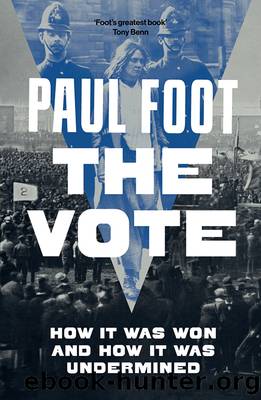The Vote by Paul Foot;

Author:Paul Foot;
Language: eng
Format: epub
Publisher: Lightning Source Inc. (Tier 1)
Published: 2024-03-13T00:00:00+00:00
From that moment on, Robert Smillie told Aneurin Bevan, âwe were beaten and we knew we wereâ.
Beaten the miners certainly were, and there was no strike by the Triple Alliance all through the storms of 1919. The â40-hours strikeâ by shipbuilding and engineering workers in Glasgow at the beginning of 1919 was defeated in scenes of appalling state violence, at the end of which one of the strike leaders, Emmanuel Shinwell, was sent to prison. The railwaymen came out in a solid strike in September, but went back after ten days with no substantial gains. Workers did win victories in smaller strikes all over the country. Nevertheless the constitutional challenge thrown down to the Triple Alliance leaders by Lloyd George gave the Government and the employers the breathing space they needed to survive.
The Great Unrest that had started in 1911 paused in the early war years, and continued through 1917, 1918, 1919 and into 1920. During those years it was obvious to everyone that the short-lived boom in the economy, together with the âland fit for heroesâ and all the rest of the Lloyd George gobbledegook, was a mirage. The slump of 1920 devastated the employed population. By the end of that year there were over a million out of work. The second phase of the Great Unrest was at an end. At last Lloyd George saw the opportunity for a counter-attack to put the unions in their place. He appointed as Minister of Labour, and later as President of the Board of Trade, the Tory MP for Glasgow Hillhead, Sir Robert Horne. Horne was an accomplished and dedicated class warrior. In his memoirs, published in 1924, the retired minersâ leader Robert Smillie wrote that Horne was both terrified and pugnacious at the thought that the revolution was at hand. âHe tells us,â wrote Smillie of Horne, âthat he never walked along Whitehall without paying very close attention to the lamp-posts. He even found himself wondering which of them would be selected for the honour of supporting his body when the revolution took place.â Small wonder then that Sir Robert stood shoulder to shoulder with the corrupt and greedy coal-owners. He did not even recognize the desperate condition of the miners. He was just the man for the planned offensive of 1921. In February, Sir Robert summoned the minersâ leaders and told them he intended to remove all wartime controls on the mining industry. This single measure would, he boasted, wipe out the âwar wageâ and the âSankey wageâ, the little bonuses the miners had won over the years. Horne and any other Government minister who deigned to take part in the farce of the ensuing negotiations made their intentions quite plain. They wanted to clear out of the mining industry, to wash their hands of any responsibility for minersâ wages and conditions. They agreed that decontrol would wreck the lives of thousands of miners and their families, but insisted that that was a necessary consequence of the free market they supported.
Download
This site does not store any files on its server. We only index and link to content provided by other sites. Please contact the content providers to delete copyright contents if any and email us, we'll remove relevant links or contents immediately.
The Secret History by Donna Tartt(16762)
The Social Justice Warrior Handbook by Lisa De Pasquale(11517)
Thirteen Reasons Why by Jay Asher(7856)
This Is How You Lose Her by Junot Diaz(5845)
Weapons of Math Destruction by Cathy O'Neil(5094)
Zero to One by Peter Thiel(4885)
The Myth of the Strong Leader by Archie Brown(4821)
Promise Me, Dad by Joe Biden(4493)
Beartown by Fredrik Backman(4489)
How Democracies Die by Steven Levitsky & Daniel Ziblatt(4465)
Stone's Rules by Roger Stone(4455)
The Fire Next Time by James Baldwin(4398)
100 Deadly Skills by Clint Emerson(4128)
A Higher Loyalty: Truth, Lies, and Leadership by James Comey(4073)
Rise and Kill First by Ronen Bergman(4062)
The David Icke Guide to the Global Conspiracy (and how to end it) by David Icke(3934)
The Farm by Tom Rob Smith(3908)
Secrecy World by Jake Bernstein(3828)
The Doomsday Machine by Daniel Ellsberg(3772)
